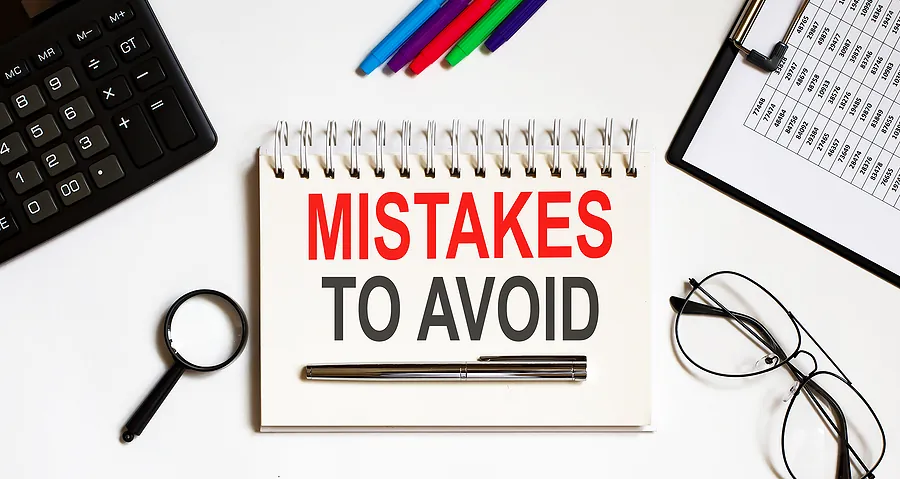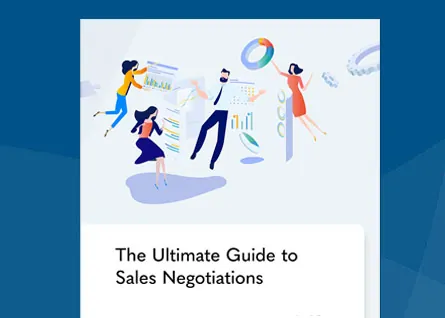Tips to Maintain Control of a Sales Negotiation

In our recent white paper The Ultimate Guide to Sales Negotiations, we discuss how negotiations improve with consultative selling. By stressing long-term relationships over short-term sales, sellers should form partnerships and work with buyers to achieve the best outcomes. However, while both sides have their wants, and one side’s needs should not supersede the other’s, it is still essential that sellers control the tone, tenor, and timing of the negotiation. After all, it is the seller’s job to guide the buyer through the sales process and present solutions that meet their needs. If buyers could do this on their own, they would not be negotiating. Here are 10 tips to help sellers maintain control of a sales negotiation to achieve win-win outcomes:
Sales Negotiation Tips
- Preparation
The more you know, the stronger your position. Before negotiating, sellers must understand the buyer’s business. They must show how solutions impact immediate concerns while also looking long term, anticipating changes to the buyer’s industry that offer opportunities for growth. In addition, sellers must be familiar with their own competition. This includes their products, prices, warranties, and support. These days, buyers are more knowledgeable; they have already done their own research. You must be ready to contrast your products and highlight how they offer the best value, mainly when it comes to price.
- Deal With Decision Makers
When negotiating, it’s essential sellers know all the decision makers, especially those with final authority. Without this, you can win over everyone, your contact, their boss, and their boss’s boss, but you may still need to renegotiate everything. In addition to business directories and social media searches, ask every contact you make who else you need to engage. The more names you get beforehand, the less chance a last-minute boss of bosses wipes out your work. In addition, be alert to casually dropped names. Penelope could be the sweetest-sounding name, until you learn she’s in procurement and drives a hard bargain.
- Set the Agenda
As part of your preparation, set a specific agenda. Put some thought into it and consider things like the timing of the sections, as well as possible breaks. You want to make sure all the players are familiar with each other, so leave room for introductions. If the meeting is virtual or features virtual participants, consider extra time for intros. In addition, practice the pace beforehand, so you can gauge which sections can be sped up and which require additional time. Remember, an agenda helps ensure maximum attention and prevents people from checking out. Also, consider engagement, such as frequent check-ins and using people’s names like “That’s a great question, Melanie.”
- Let the Buyer Lead
In The Ultimate Guide to Sales Negotiations, we note how, in chess, the white pieces always make the first move. This gives them a competitive advantage. While letting the buyer lead can seem counterintuitive to maintaining control, it presents you as personable and amenable. It shows you are willing to listen, hear their concerns, and are prepared to work with them.
- Approach Negotiations in the Spirit of Cooperation and Collaboration
Some businesspeople treat negotiations as a game with clear winners and losers. While that adds a spicy flavor to the encounter and can lead to some cocktail party stories, that philosophy doesn’t lend itself to the best deals, where both sides benefit. Remember, you’ve likely gotten this far by being a Trusted Advisor and building up the relationship over time. Shifting from that convivial mode to a potentially combative one may well harm the relationship and damage all the hard work you’ve put in up to this point. Instead, continue the stance of partnership – how can both sides help and benefit each other?
- It’s All in the Eyes
Do not be a passive participant. As buyers speak, evaluate body language for clues into the alignment of the players and actively listen for hidden or new concerns that have arisen. Poker face works great on the phone—more like poker voice—but in person it’s harder to do. One “tell” to look for is this: If the customer does not make eye contact while insisting on something, it’s pretty likely that he or she is making an unreasonable request—and they know it. With diplomacy and tact, you can respectfully disagree with their difficult demand, which will probably disappear from the table in a hurry. Also, express warmth and empathy, and invite them to share. Gauge your own body language and maintain eye.
- Give to Get
As negotiations are give and take, sellers must know their must-haves, their concessions, and what they are willing to trade. Remember, these lines can blur as a deal gets closer. Sellers can be tempted to give more than they intended. Of course, it’s best not to present your must-haves as must-haves. This will result in a very short negotiation. When making concessions, be sure you receive something in return. After all, it’s a negotiation, not a fire sale. As noted in The Ultimate Guide to Sales Negotiations, trades should be assessed for their value. When a chess player trades a knight for a bishop, the value is comparable. Never trade a major piece for a lesser one, like a rook for a knight.
- Don’t Offer Your Bottom Line Early On
One of the key points in a negotiation is to hold off showing your hand early. How many times can you recall being asked to “give your best price.”? And once you have offered your best, how many times has a customer asked to go lower? Think of it this way, if you could lower your price by 10%, start out with a 2 or 3% discount to leave yourself some room for additional concessions. The buyer might be satisfied with a 5% discount, thus preserving the other 5%.
- Move Beyond Money
Whether haggling over garden gnomes at a garage sale or negotiating a raise, talking about money can be awkward if not downright stressful. In a sales negotiation, price is unavoidable, but it doesn’t have to be uncomfortable. Always lead with empathy, “I understand price is a concern,” but move past dollars and cents into value. The more value you can build into a product, the easier it is for buyers to understand the price. Though it can be tempting to offer discounts, especially if a deal seems imminent, this can be a trap. Sellers who readily discount send the wrong message, and buyers then expect it throughout. Instead, include an extended warranty or the gold-package customer service plan.
- Tact, Not Tackiness
You don’t want to annoy the customer or make them feel like you’re the proverbial holding-out salesperson engaging in a game of information hoarding when it comes to price. You know, the old “Before I answer that, tell me how much you want to pay.” Use tact when they request pricing info and you’re not ready to divulge what you haven’t even been able to determine yet. Some simple rules to follow are:- Strategically delay the price discussion
- Your script could go something like this: “I’d be happy to give you the pricing details. But as you know there are many options with this product. So I’d like to ask you a few more questions to better understand your needs, and from there, I can provide you with a specific quote.”
- Give a price range
- You might say, for example, “We pride ourselves on being able to offer solutions for every budget. On the lower end, you will pay around [fill in the blank amount]. Up on the higher end, it will be between [fill in the blank amount] and [fill in the other blank amount].”
- Strategically delay the price discussion
- Keep Conversation Amicable
Negotiations can be stressful, but sellers should keep their composure and maintain control. If a buyer is being difficult, show them you understand their concern, and work to find a solution. It can be easy to lose patience, especially when a buyer is stubborn. Resist the urge to dismiss them or see past their needs to your own. Express empathy, lean in when speaking, and maintain eye contact. Keep the discussion pleasant. Remember, this is a potential future partner, and their needs are paramount. What seems a minor issue to you can be a deal breaker for them, and you may need to rethink your solution.
- Reinforce Agreements
Throughout a negotiation, sellers should highlight and reinforce agreements that have been reached. Before moving on to the next point, remind them of the agreement, “I’m glad we’re on the same page with shipping, and this leads into receiving.” Doing this consistently shows your willingness to work with them and your appreciation for their buy-in. It reminds them that your positions are not far apart and illustrates the ease with which you work together. It is also an opportunity for any last questions or concerns and lets sellers know if they need to reiterate, reassure, or reemphasize the agreement prior to addressing the next item.
- Know When to Walk
Although this sounds negative, it’s a vital part of controlling the negotiation. If all avenues have been exhausted and an agreement is no longer beneficial or profitable, buyers need to know you are willing to walk. Of course, you must show this without stating ultimatums, “This is my final offer.” That may make for dramatic movie moments, but in actual practice, you may kill any possibility of working with this client, now and in the future. Remember, people do not respond well to ultimatums. Even at this critical juncture, keep your composure. A seller’s willingness to walk can restart a stalled negotiation and get you back to a level playing field.
- Never-Never Land
Never put the ink on a deal until the negotiations wrap up and you’re certain both sides are in agreement. You do not want to find yourself in the position of regretting putting things in writing prematurely—hardly a good deal for you.
Never scoot your chair up to the bargaining table before both sides are in clear agreement on what it is you’re going to be negotiating. First focus on the sale, and then enter the negotiation portion.
Ideally, negotiation won’t even come into play: When all things are aligned, your data, along with your record of success, will do the talking for you.
- Set the Next Steps
Just as Rome wasn’t built in a day, a sales negotiation is not a one-off event. Additional meetings may be requited. To maintain the process, sellers should outline the steps going forward and assign tasks. This could include creating a team, choosing the best people, and organizing the equipment needed to implement the agreed-upon solutions. In this, it’s important to maintain momentum. Keep in close contact with the buyers and their team members. Perhaps visit their facilities and offer you expertise to make the process smoother. This is a great opportunity to reimagine the solutions you provide and find ways to do more for the client and their business.
Mistakes to Avoid

- Not Negotiating With a Final Authority
This is probably the most common mistake in a negotiation, but it is also the most difficult to avoid. Of course, it goes without saying that preparation is key, but no matter how much you research, the most important decision makers have a habit of hiding. In addition to your own due diligence scanning, searching, scouring corporate bios and pictures, ask each new contact who else needs to get on board. Play attention to every name that comes up during your preliminary discussions. Sometimes, even the most casual reference, “Manny might love that,” can reveal the decision maker with the final authority.
- Setting a Bottom Line
Knowing the boundaries of a “good” and “bad” deal is critical to any negotiation. The clearer reps are on this, the easier it will be to move through the negotiation without accepting deals they shouldn’t. For every contentious issue that arises, reps must weigh how it affects the overall quality of the deal. Part of this is avoiding tunnel vision or getting fixated on a point, such as stating deal breakers or setting a bottom line. Instead, evaluate each decision in terms of what can be added or subtracted to resolve issues within the larger framework of your goals.
- Being in a Rush
While pop culture often presents sales professionals as fast talking, a career in sales requires patience. This is important during a negotiation. As consultative sellers, salespeople should build negotiation into the sales process. From prospecting to discovery to presentation, sellers should reach as many agreements as possible before starting a formal negotiation process to work out specific language. At this stage, there may be a natural inclination to move faster. After all, you’re in the homestretch, and the deal you’ve been cultivating is finally in sight. Remember, patience is a virtue, and in Arthurian legend, only the purest of knights could achieve the grail.
- Not Building in Concessions
Before entering a negotiation, sellers should know what they’re willing to give up. Maybe these are your ideal takeaways, but more importantly, these are the things you can trade. In The Ultimate Guide to Sales Negotiations, we compare this to thinking like a chess player, evaluating trades based on the comparative value of pieces. As bishops and knights are considered three points each, they could result in a fair exchange. However, if one is more comfortable with the movement of a bishop over a knight, it might not be beneficial. Know in advance what you want to get, but just as important, know what you’re willing to concede.
- Overnegotiating
If this sounds like a physical ailment, think of it as overexerting during a workout. A common mistake is sellers pushing too hard or doing too much. In a negotiation, this often occurs when sellers hear something as an ultimatum, a make-or-break decision, that really isn’t. Instead, it’s an opportunity build in more value. For example, if the buyer says they cannot pay more than $20,000, this does not have to be a deal breaker. The best negotiators know they now have a target number the buyer is comfortable with. This is an advantage because it gives sellers greater maneuverability. They can now better judge what they can take off the table and what value they can add to sweeten the deal.
- Not Achieving Technical Wins
While outside of sales, a technical win sounds like a consolation prize, it is an important part of the negotiating process. These are things you have won along the way, agreements you have reached, or knowledge you have gained, such as knowing the buyer prefers your products or your company over the competition. They could be small, but the best negotiators know to keep these in their pocket as incentives to work though the challenges that can arise. Technical wins can also be put together and used as leverage. The important thing is not to dismiss them out of hand but recognize when you have achieved one.
As illustrated in our white paper, negotiations are a lot like the game of chess. It can be intimidating at first, but once you learn the pieces, how they move and their relative value, you’re soon off and running, making offers and trades. Another key to chess is gaining control of the board. Players often open from the center, with king or queen pawns, and then move their knights and bishops into centered positions as well. Heavy artillery, such as rooks and queens, come later. In the same way, negotiations are a process. Usually, like chess, the longer they go, the better, and it all starts with taking and maintaining control. Sellers who do this put themselves in the best position to form relationships and achieve win-win outcomes.
Enroll in Critical Negotiation Training Today
Ready to elevate your sales game to new heights? Take the first step towards mastering critical negotiation skills that will set you apart from the competition. Sign up now for our exclusive Critical Sales Negotiation Training and unlock the secrets to closing deals with confidence and finesse. Don’t miss out on this opportunity to enhance your sales expertise and achieve unparalleled success. Join us today and revolutionize your approach to negotiation!

- Account Planning (11)
- Awards (50)
- Client Testimonial (37)
- Personal Branding (19)
- Podcast (11)
- Research (68)
- Sales Career Development (85)
- Sales Coaching (153)
- Sales Consulting (133)
- Sales Culture (164)
- Sales Enablement (340)
- Sales Leadership (108)
- Sales Management (242)
- Sales Negotiation (16)
- Sales Prospecting (124)
- Sales Role-Playing (18)
- Sales Training (229)
- Selling Strategies (255)
- Soft Skills (67)
- Talent Management (92)
- Trusted Advisor (27)
- Virtual Selling (41)
- Webinar (10)

































